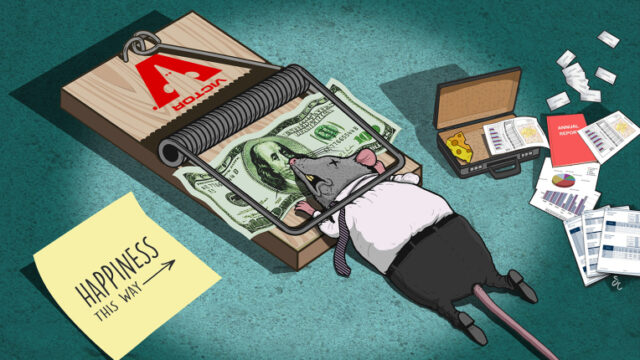How Much is Enough?

How much is enough? In our “growth for growth’s sake” economy, the answer is “there is never enough” because continuous expansion of consumption is necessary to drive “growth,” without which the global economy will collapse into a Depression of great suffering.
The underlying assumption of “growth for growth’s sake” is that human desires and greed are both infinite, as is human ingenuity. Ingenuity + greed = more goods and services to fulfill humanity’s insatiable desire for more of everything.
As social critic Christopher Lasch observed, our modern version of Progress is based on this insatiability of human desires: there is always something more to want, buy and consume, and so growth is limitless.
But are any of these assumptions actually true?
Is it an absolute fact that consuming less will immediately lead to great suffering?
I’ve been running household experiments on consuming less simply by eliminating waste, and have found that consuming less had no effect whatsoever on the high quality of life we enjoy. Our most recent electricity utility bill shows we consumed 105 kWh of grid electricity, roughly 20% of the average household consumption in our area of 500 kWh per month.
(We have a modest array of 800w of photovoltaic panels–roughly 10% of the typical rooftop solar array–that generate some of our own electricity, but even with this additional electricity generated by “our own utility,” we consume about 1/3 of other households.)
Given our culture promotes “growth for growth’s sake” and extols profits earned by expanding consumption, and therefore offers few if any incentives to reduce out-and-out waste, it’s obvious that we could collectively reduce consumption significantly while maintaining a high quality of life.
So the assumption that consuming less will lead to great suffering is false. It may well reduce profits, but reducing consumption does not necessitate a collapse into Depression.
Is it absolute fact that human desires are insatiable?
In Lasch’s book The True and Only Heaven: Progress and Its Critics, he traces the modern concept of Progress to the conversion of insatiable desire from a sin that must be guarded against as “a source of frustration, unhappiness and spiritual instability” to “a powerful stimulus to economic development,” an expansion that was unlimited as “there was no foreseeable end to the transformation of luxuries into necessities.“
Before insatiable desire was worshiped as an economic necessity and transformed into the bedrock of human existence, limits on human greed were viewed as integral forces in the incorporeal realm of Heaven and Earth. Just as insatiable pride leads to hubris and the emergence of the countervailing forces of Nemesis to deliver a reversal of fortune to the prideful, so insatiable desire and greed will generate the downfall of the greedy.
It can be argued that human desires for novelty and knowledge may well be insatiable, but these can be sated without consuming much in the way of additional resources. (Make a new recipe with the same ingredients, borrow a book, etc.)
As for the insatiable desire for more money to buy more of everything, author Kurt Vonnegut recounted a conversation he once had with fellow author Joseph Heller.
“Joseph Heller and I were at a party given by a billionaire on Shelter Island. I said, ‘Joe, how does it make you feel to know that our host only yesterday may have made more money than your novel Catch-22 has earned in its entire history?’ And Joe said, ‘I’ve got something he can never have.’ And I said, ‘What on earth could that be, Joe?’ And Joe said, ‘The knowledge that I’ve got enough.'”
Source: The New Yorker, May 16th, 2005
The claim that “growth for growth’s sake” is absolutely essential to stave off disaster is itself a recipe for disaster, for wasting resources in the purported fulfillment of insatiable desires is a manifestation of greed and hubris on a global scale that has already spawned Nemesis in the many forms of Anti-Progress I’ve described in my book The Mythology of Progress.
It’s clear that waste is not growth, that consuming less does not necessitate a decline in the quality of life, and holding that a throwaway / disposable economy (what I call The Landfill Economy) is absolutely the only way to avoid human suffering is hubristic nonsense, as the path of “growth for growth’s sake” and the Waste Is Growth Landfill Economy is the path to economic collapse and great human suffering.
In other words, the status quo has it exactly backwards. Nemesis has patiently awaited our belated recognition of this but has finally become impatient. The consequences of relying on insatiable desires and greed to permanently expand a disposable Waste Is Growth Landfill Economy are currently in the delivery queue.
